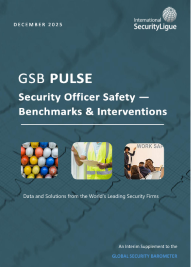
Key Points
- Sexual harassment on public transit is pervasive yet grossly underreported, inflicting deep psychological, social, and economic harm worldwide.
- High-profile awareness campaigns (London’s ‘Zero-Tolerance’, SF’s ‘Not One More Girl’, Aix-Marseille’s ‘Aucune tenue’…) raise visibility but are not enough to stop entrenched abuse.
- Rigorous studies show that sustained investment in visible, well-trained security personnel can cut incidents by up to 66%.
Often concealed and significantly undercounted, unwanted sexual behavior in public transit systems is a global concern, causing lasting psychological harm to victims, degrading quality of life for urban residents, and threatening economic activity and sustainable urban growth.
Prevention campaigns have periodically surfaced around the world, from London’s Zero-Tolerance Campaign, to the “Not One More Girl” campaign in San Francisco, to the ‘Aucune tenue, aucun comportement ne justifie le harcèlement’ push in Aix-Marseille-Provence. But given harassment’s entrenchment, awareness programs alone seem insufficient.
“Public education is an important add-on, but slogans need security to build upon,” said Stefan Huber, Director General of the International Security Ligue. “City leaders and public transportation officials must make investments in security if we truly want to get at the root of this global problem.”
There is strong evidence that cities can realize a substantial positive return for investing in greater security. Recent research shows visible security solutions can reduce incidents of sexual harassment in public transport by 66%.
A Dangerous Ride
Unwanted sexual behaviors—from catcalling, harassment, to groping and sexual assault—are widespread within mass transit systems. Whenever studied, researchers report eye-popping levels of victimization.
- 90% of women and girls encounter sexual harassment while commuting in public vehicles in Bangladesh (“No one is safe in a public bus”: Debunking the Gender Myths of Sexual Harassment in Public Transports of Bangladesh,” International Journal of Humanities and Cultural Studies, Sept.2024).
- 73.4% of riders surveyed say they’ve experienced first-hand unwanted sexual behavior on trains or in train stations in Great Britain (“Experiences and Reporting of Unwanted Sexual Behaviors on Great Britain’s Rail Network: A Survey of Victims and Witnesses with an Embedded Randomized Vignette Experiment on Callback Effects,” Victims & Offenders, April 2024).
- 67% of riders on San Francisco's Muni system reported experiencing sexual harassment in the last six months (“Muni Rider Safety and Harassment Research,” Dec. 2024).
Different types of sexual harassment are more likely to happen in certain transit settings than others, and incidence rates vary by particular socio-spatial contexts; however, the problem is universal, according to a global comparative study that surveyed 11,710 college students from 18 cities in six different continents. “The study finds that sexual harassment is a common occurrence in all cities,” researchers concluded (“Sexual harassment on transit: a global, comparative examination,” Security Journal, 2022).
Undercounting the Problem
Unless transit operators or public officials undertake specific initiatives to measure the scale of the problem, they likely don’t know how bad it is. Most incidents go unreported, studies show. In Japan, for example, over “90% of those who had been exposed to groping on a train did not report it to the officials.” (“Transit safety among college students in Tokyo-Kanagawa, Japan: Victimization, safety perceptions and preventive measures,” Crime and fear in public places: Towards safe, inclusive and sustainable cities, pp. 160–175, 2020.)
Even reporting of serious incidents is uncommon, with one UK study discovering that “only 15% of victims of the most serious sexual offences reported the incident to the police,” as cited in the UK Rail Network study.
Underreporting can make the problem easier to avoid and compounds general reluctance to acknowledge safety concerns in public transportation, according to researchers. They cite other obstacles to positive change, including the perceived need to increase ridership with public messaging that insists public transport is safe, divergent perceptions of exactly what constitutes “safety,” and multiple agency stakeholders with conflicting priorities.

Significant and Lasting Harm
“Though often seen as “lesser-harm” incidents, [they] have profound psychological, emotional, and behavioral impacts on victims and witnesses,” researchers conclude in the 2024 UK Rail study. In the immediate aftermath, victims report feeling violated, uncomfortable, angry, and shocked; many report anxiety and feeling embarrassed. And the impacts linger, according to the data. A majority of victims (61.2%) said they felt the effects for up to two years, including low self-esteem, depression, stress, anxiety, and social withdrawal.
The efficiency and accessibility of public transport are essential in promoting sustainable urban growth, which is dramatically undercut when unwanted sexual behaviors in public transport create an atmosphere of fear and insecurity—among both witnesses and victims—that hinder economic activity. Women and girls especially are forced to alter travel patterns, change schedules, or avoid public transportation; people quit jobs, avoid visiting certain areas and choose not to travel at certain times; and individuals refrain from fully engaging in their communities and its economic development.
The consequences go beyond the immediate distress suffered by the victims, suggesting suffering throughout societies and challenging our notions of safe communal spaces — Study of Unwanted Sexual Behaviors in Great Britain's Rail Network
In the end, city officials need to understand that when commuting evokes stress and fear, the lives of citizens worsen, as noted in a study of public transport commuting women in Spanish cities. (“What makes female commuters‘ unhappy’? Harassment, fear of crime, and unsought travel behavioral adaptations in public transport against life satisfaction,” Journal of Transport & Health, July 2024).
The overall life satisfaction of female daily public transport travelers may be significantly affected by negative commuting experiences. — Study of Women Commuters in Spain
Life quality is compromised by exposure to sexual harassment experiences and fearful events, and also by the necessity to make undesired changes. “Often impacting them in the form of—among many others—economic (e.g., having to pay for a more expensive means of travel), personal (e.g., using family time for longer commutes), social (e.g., depending on others for safe travel), and opportunity access-restricting (e.g., a gradual loss of control over key life choices) impairments suffered in consequence.”
Stopping Unwanted Sexual Behaviors in Public Transit
Routine Activity Theory—a criminological framework—would ordinarily suggest that the presence of people reduces violations by increasing perpetrators’ fear of being caught. But application is limited in a public transport context, with little deterrence and because harassment is most common during rush hours, as overcrowded trains or buses provide anonymity to offenders and access to a greater number of potential targets.
Studies show that people who witness incidents on public transport often don’t do anything about it. In 6 out of 10 incidents, according to the UK Rail Study, victims of unwanted sexual behaviors said witnesses either pretended not to see what was happening or watched from a distance. In fewer than one-in-five cases did a witness do anything to intercede.
So, what would deter victimization?
Solutions require action in many areas, including staff training, adherence to safe design principles, public awareness initiatives, and clear reporting systems, but visible security may hold the greatest potential. A recent randomized controlled trial of train stations in England and Wales proves the substantial value of repeated visits by security personnel to locations where there is a greater propensity for incidence of unwanted sexual behaviors.
“The findings of our research indicate that non-police security personnel have the potential to act as efficient guardians within the mass transit system, thereby playing a crucial role in mitigating the risk of Unwanted Sexual Behavior, as well as violence more broadly, by approximately 66%.” (“Private security for curbing unwanted sexual behaviours in train stations: a place‑based randomised controlled trial,” Journal of Experimental Criminology, July 2024.)
Researchers offered two caveats for a security intervention to provide lasting good: financial commitment and deployment of quality officers. “Securing continuous funding is a critical challenge that must be addressed to avoid a lapse in protection, which could result in a resurgence of USB incidents,” the study concludes. “Moreover, the effectiveness of security personnel hinges on their training and readiness to adapt to evolving threats.”






